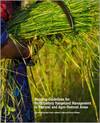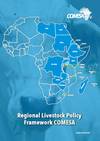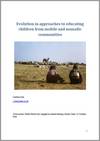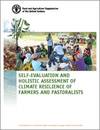L'objectif de cette étude est d’améliorer durablement la gestion des conflits liés à la transhumance transfrontalière en Afrique de l’Ouest, dans un contexte de changements globaux (variabilité et changement climatiques, pression foncière, dégradation de la biodiversité, maladies animales émergentes et ré-émergentes, etc.). Elle a permis notamment d’améliorer les connaissances sur les déterminants de la transhumance transfrontalière et des conflits, d’analyser le cadre politique et juridique, de documenter les innovations et les bonnes pratiques de gestion durable des ressources pastorales, et de proposer des options stratégiques de prises de décision pour une gestion apaisée de la transhumance transfrontalière en Afrique de l’Ouest.
Year of publication: 2015Organization: Individual authors
Topic: Conflict, Land
Language: Français
Type of document: Technical
Geographical coverage: West Africa
Resource mapping can assist in investigating rangeland management systems, negotiating resource management plans, and implementing and monitoring progress in Participatory Rangeland Management (PRM). These guidelines, prepared for development practitioners working in the rangelands of Ethiopia, will contribute to achieving more sustainable use of rangeland resources and arresting and reversing degradation. They will thus contribute to improved livestock productivity, greater resilience of pastoralist communities and reduced poverty.
The guidelines outline the three stages of a mapping exercise – preparation, facilitation and validation – and provide information on the purpose, methods and planned outcomes of each stage. The final section brings examples of the practical application of participatory resource mapping within PRM.
Organization: United States Agency for International Development (USAID)
Topic: Climate change, Environmental services, Indigenous peoples, Land, Participation
Language: English
Type of document: Technical
Geographical coverage: Eastern Africa
Although livestock represents a significant portion of Gross Domestic Product (GDP) and supports millions of livelihoods, especially in sub-Saharan Africa, this sector is seriously constrained by animal diseases, inadequate investments, and unfavourable government policies.
The COMESA Regional Livestock Policy Framework aims to support the strengthening of COMESA to play its role of coordination, harmonization, integration and support to countries with the aim to stimulate a more conducive environment for public and private investments in the livestock sector. It relies heavily on the review of livestock and related policies of member states and expansive body of literature and research on animal agriculture in the COMESA region, the livestock trade, its economics and sociology. This policy has implications for pastoralists in Eastern and Southern Africa, that occupy arid and semi-arid lands and contribute greatly to the livestock economy.
Year of publication: 2015Organization: Common Market for Eastern and Southern Africa (COMESA)
Topic: Economy, Environmental services, Food security, Resilience, Value addition
Language: English
Type of document: Policies and legislation
Geographical coverage: Eastern Africa, Southern Africa
This paper discusses providing education to children from families with mobile livelihoods. It includes case studies from nomadic groups’ education in Kenya, India, Afghanistan and Indonesia.
Year of publication: 2015Organization: Individual authors
Topic: Education
Language: English
Type of document: Scientific
Geographical coverage: Global
Чарогоҳу алафзорҳои табиии Тоҷикистон бештар аз 3,9 млн гектар буда, дар минтақаҳои гуногун – аз водиҳои гармсер то баландкӯҳҳо паҳн шудааст. Иқлиму хокҳои гуногун сабабгори асосии набототи гуногуни чарогоҳу алафзор аст. Дар таркиби набототи чарогоҳ бештар аз 1000 намуди растаниҳои гулдор – алафҳои яксолаю бисёрсола, буттаю нимбуттаҳо вомехӯранд.
Year of publication: 2015Organization: German Agency for International Cooperation (GIZ)
Topic: Economy
Language: тоҷикӣ / تاجیکی
Type of document: Technical
Geographical coverage: Central Asia
This review draws on examples, interventions and lessons from pastoralist and other livestock systems across the world in order to assist in addressing the following identified problem statement: “Poor conditions of sale discourage market orientation for millions of micro- and small-scale livestock keepers (pastoralists and agropastoralists) across the arid and semi-arid lands of the Horn of Africa, limiting their abilities to effectively deal with risk and increase productivity and wealth.”
Examples are drawn from cases in Botswana, Mongolia, Afghanistan, Brazil, Benin, Nigeria, Uganda and Kenya, covering initiatives relate to infrastructure, animal health, telecommunications, insurance, sharia-compliant micro-credit, policy, transaction costs, social capital and gender.
Year of publication: 2015Organization: The Economist Intelligence Unit (EIU)
Topic: Economy, Finance, Resilience
Language: English
Type of document: Technical
Geographical coverage: Eastern Africa, Global
This publication presents the scientific background of the Self‑evaluation and Holistic Assessment of climate Resilience of farmers and Pastoralists (SHARP) tool. SHARP assesses resilience through a participatory survey to both measure resilience and to engender discussions on how to increase farmers’ and pastoralists’ resilience. It was was developed over two years with the participation of over 150 academics, practitioners and civil society. SHARP was also field tested in Angola, Burkina Faso, Mali, Senegal and Uganda with farmers and pastoralists. It has been recognized that there is a need to both provide a rigorous assessment of the resilience of farmers and pastoralists, while also incorporating the views and needs of those people.
Year of publication: 2015Organization: Food and Agriculture Organization of the United Nations (FAO)
Topic: Climate change, Resilience
Language: English
Type of document: Scientific
Geographical coverage: West Africa, Central Africa, Eastern Africa, Southern Africa
This report explores insights from five case studies that have made significant recent progress in addressing the challenge of insuring poor smallholder farmers and pastoralists in the developing world. Evidence from these case studies can inform the ongoing debate about the viability of scaling up index-based insurance for vulnerable smallholder farmers in the developing world. The rapid progress observed in recent years suggests that index insurance has the potential to benefit smallholder farmers at a meaningful scale, and suggests the need to reassess arguments that lack of demand and practical implementation challenges prevent index-based insurance from being a useful tool to reduce rural poverty.
Year of publication: 2015Organization: CGIAR Research Program on Climate Change, Agriculture and Food Security (CCAFS)
Topic: Economy, Innovation, Social services
Language: English
Type of document: Technical
Geographical coverage: Global









